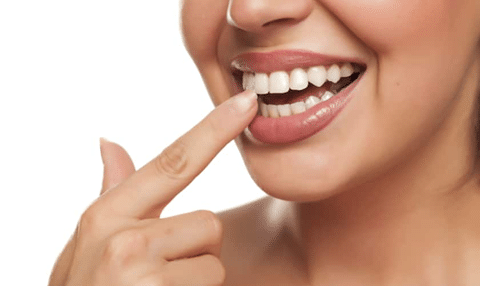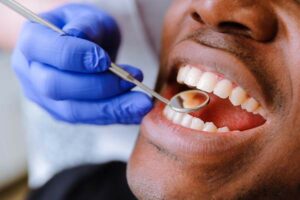Gum disease, also known as periodontal disease, is a bacterial infection that affects the tissues surrounding your teeth and the bone supporting them. It generally starts with plaque buildup, a sticky film of bacteria that forms around teeth when they are not cleaned properly. If not removed through proper oral hygiene, plaque can harden into tartar (or calculus) which is harder to remove and can lead to gum inflammation, known as gingivitis. At this stage, the most common symptom is gum bleeding and swelling. If left untreated, gingivitis can progress into periodontitis, a more severe form of gum disease because bacteria descend into bone level and affect the stability of the teeth.
At this stage, gum disease symptoms include:
- Red, swollen, or tender gums
- Bleeding gums
- Receding gums, making teeth appear longer
- Persistent bad breath
- Pus between teeth and gums
- Loose or shifting teeth
- Changes in the way teeth fit together when biting
Thankfully, gum disease is treatable at the early stages. Since this disease is caused by poor cleaning habits, the best treatment available is to implement good cleaning techniques. In some, more severe cases, bone grafts may be needed to restore the bone level and stability of teeth. Here are the treatment steps:
- The initial treatment involves removing plaque and tartar through scaling and root planing. This deep cleaning is performed by a dental professional and it aims to remove bacteria and all the accumulated tartar. At times, it is necessary to make an incision and open a flap in your gums, to access your roots and scale them through. This is called a perio surgery and will be performed by a qualified periodontist. This surgery may or may not involve bone grafts.
- Improved Oral Hygiene: Good oral hygiene practices at home are crucial. These include regular brushing, flossing, and using an antiseptic, non-alcoholic mouthwash to reduce plaque and prevent its buildup. These cleanings have to be done at least twice a day every day.
- Lifestyle Changes: It is important to be constant in your daily cleaning routines, which can involve creating habits that you may not be used to. Quitting smoking or tobacco use can significantly improve gum health and aid in the treatment process.
- Medications: In some cases, dentists may prescribe antibiotics or antimicrobial mouth rinses to help control infection and reduce bacteria.
- Ongoing Maintenance: Regular dental check-ups and cleanings are essential to monitor and maintain gum health. Dentists will normally recommend quarterly visits to perform professional cleanings and checkups.
Early detection and intervention are crucial in managing gum disease. Prompt treatment and diligent oral hygiene practices can often control and even reverse the early stages of gum disease, preventing further damage to the teeth and gums. Remember periodontal disease is one of the main causes for tooth loss, which can end in the need for individual or multiple dental implants, All on 4 and sometimes removable dentures. At the Costa Rica Dental Team we will offer an integral solution no matter how complex your case. If you believe you are suffering from gum disease but feel that getting dental treatment is not an option due to its cost feel free to contact us. We may be the solution you are looking for. Don´t wait until it is too late, contact us now!




